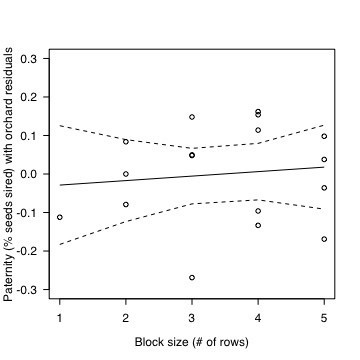Trade-offs between clonal & sexual reproduction
Clonality is very common in flowering plants, but its consequences for sexual reproduction have rarely been explored. While clonal growth can increase the number of flowers a plant produces it may also limit reproductive success through pollen discounting (reduction in pollen exported to adjacent clones) and pollen limitation (failure of outside pollen to reach the centre of a clone). Using clones of domestic apple (Malus x domestica) that ranged from 1 to 5 orchard rows wide, we found that the patterns of siring success were consistent with the presence of pollen discounting, but we failed to detect evidence for pollen limitation. The results suggest that paternal function may be more sensitive to the effects of clonality than female function.
